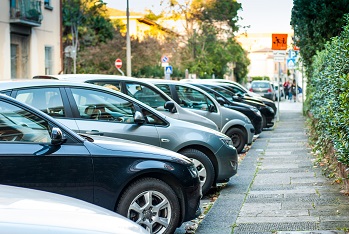3D city modelling for smarter parking

To apply his idea, Prof. Van Gool received an additional ERC Proof of Concept grant and created a spin-off that commercialises a video-based smart parking system. In the city of Locarno, Switzerland, "Parquery" stands the test.
Reflecting buzzing city life
Nowadays, city representations, be it in 2D or 3D, are mostly static and require a considerable amount of manual work, updating and picture taking. But for Prof. Van Gool, the future of modelling lies elsewhere. As cities continuously move, evolve and grow, rather than improving the existing methodologies, the ERC grantee works in the development of novel 3D live views and dynamic street maps of urban areas. For this purpose, he takes into account the active aspects of cities, such as traffic flows, as well as video compilations of specific events and landmarks.
"Current digital city representations are like ghost towns, with at best pedestrian and cars frozen in time. The aim of VarCity is to model, in 3D, the buzzing life of a city. It will improve the existing methods in terms of visual quality, completeness, efficiency, size and applicability", explains Prof. Van Gool, based at Eidgenoessische Technische Hochschule Zuerich (ETH).
Automatic identification of objects and crowdsourcing…
Object class recognition plays a key role in Prof. Van Gools research. The computer system of VarCity contributes to localise objects in a specific scene and to classify them per categories, such as "building", "car", "pedestrian" or "window". The researcher also foresees to provide self-mending modelling, in order to manage the constant changes of the urban landscape. The challenge of capturing traffic flows lies in the way of collecting the corresponding dynamic data, and that is where citizens themselves have a role to play:
"As one cannot take videos of every part of every street all the time, we want to use videos coming from people's mobile devices. People will be connected almost permanently over large bandwidth; the image coverage will become much more dense than today", says the ERC researcher.
In order to derive city-wide traffic flows from such data, it is crucial that different traffic agents – like cars – can be detected and tracked from the video data with high reliability. Moreover, even if the user-supplied videos will provide an increasing influx of live video data, they will nevertheless not cover all places all the time. As a consequence, such piecemeal samples of the traffic have to be completed to traffic flows everywhere and at all times, through appropriate estimation processes.
… for smart parking
In order to test the innovation potential of his research in the VarCity project, Prof. Van Gool was awarded an ERC proof of concept grant in 2013 for Parquery, a vision-based smart parking system for monitoring on street parking occupancy. The system will be driven by the above, reliable car detection technology.
The system is currently operational in the city of Locarno, in Switzerland. Twenty outdoor cameras analyse specific parking areas all over the city. Thanks to a 3G module, the cameras send images to a web cloud. The video footage is then processed by the visual car detection algorithms that, in real time, provide information on parking availability through a website and a mobile application.
"Occupancy information is mainly available in parking garages and off-street parking, where parked cars are easily counted. But parking search assistance remains one of the major unsolved problems in urban mobility. Parquery can help to reduce traffic up to 30%, increases the speed of parking search up to 43% and it is a cheaper and easier to deploy solution than current alternatives on the market. Parquery can, therefore, help cities optimize their planning, administration and enforcement", says Andrea Fossati, CEO of the Parquery spin-off he co-founded with Prof. Van Gool.
More at ERC website
